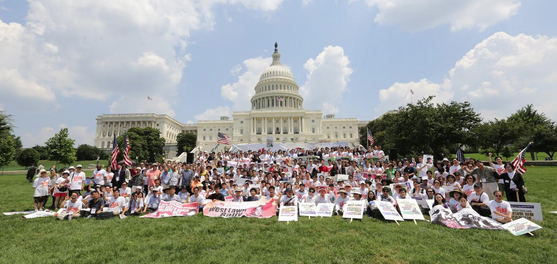![KCC members pose in front of the Capitol Building after a rally. [Steve Park]](http://www.jstudentboard.com/reporter/wp-content/uploads/2015/08/kcc.jpg)
In 2004, KCC made its first appearance as a prayer movement consisting of first generation Korean American pastors concerned about the people of North Korea who allegedly experience violations of human rights including torture, child trafficking, murder, forced labor, and religious and political persecution.
Accompanied by approximately 100 Korean American high school students, KCC is working to pass the North Korea Sanctions Enforcement Act in Congress. The bill, HR 757, would require the president to set forth a detailed plan to make unrestricted, unmonitored, and inexpensive electronic mass communications available to the people of North Korea. From July 13-16, high school interns rallied in front of the Capitol building, participated in walk-a-thons in front of the White House, and gained sponsors for the bill by visiting members of the House and Senate.
In an interview with JSR, KCC founder Reverend Peter Sohn stated, “Watching the young interns, some as young as seven years old, who come to Washington, DC year and year, inspires us first generation [Korean Americans]. You have proven yourselves to be not only future leaders but also present leaders.”
KCC has received recognition from Presidents Bush and Obama, helped pass the North Korean Orphan Adoption Bill, and helped members of the younger generation realize their potential to make a difference. The organization says it will advocate for North Korean freedom until North Koreans are able to defend themselves without oppression while cherishing the basic human rights to which all are entitled.
North Korean refugee Joseph Kim, who also attended the 2015 KCC Summer Internship and Missions Conference, told KCC and its students that he is grateful “for what they are trying to achieve with their pure motivation and compassion to help raise awareness of North Korea’s human rights issues.”

